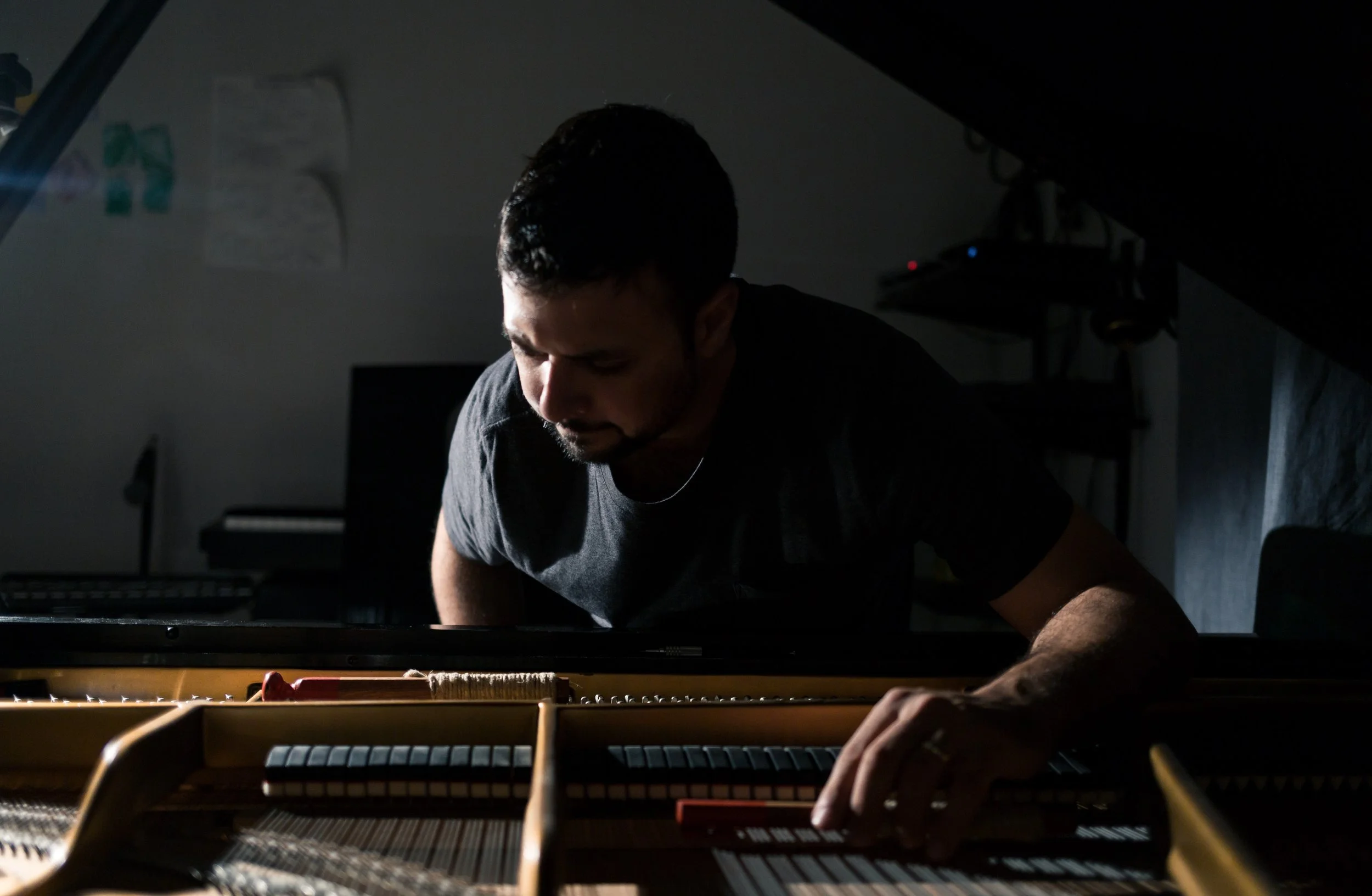Friday Night Live! Michael Malis: From Darkness We Awaken
Michael Malis with Virago
Presented by the Detroit Institute of Arts
Friday, August 26, 2022 | 7:00pm
Photo credit: Costa Kazaleh Sirdenis
The Program
1. Imperfect Intervals: Ensemble Version
II: With Clarity
X: Make a Sound
VIII: This is a Journal Entry
IX: Gently, Freely
Performers:
Meg Rohrer - violin
Wesley Hornpetrie - cello
BethAnne Kunert - alto saxophone
Michael Malis - piano
Sofia Carbonara - percussion
Live visuals by Zara Teicher
2. Throw Off the Yolk of Tradition; Resign All Posts; Hold Tightly Your Vision of How Things Could Be
Michael Malis - piano
3. From Darkness We Awaken
Performers:
Meg Rohrer - violin
Wesley Hornpetrie - cello
BethAnne Kunert - alto saxophone
Michael Malis - prepared piano
Sofia Carbonara - percussion
All music composed by Michael Malis
Pieces 2 and 3 are World Premieres
About the Music
Imperfect Intervals
Imperfect Intervals came together accidentally. I recorded these nine pieces as improvisations in October and November of 2020, and labeled the files "Sound Diary" on my hard drive. At first, that's all they were: daily diary entries, documenting a period in my life of deep reflection.
But with each new recording, I started to notice an emergent improvisational process. It seemed like the improvisations were being guided by a logic. I began to realize that more than anything, the process that was unfolding was about a manner of approaching the instrument. It was a mindset, a headspace. Gradually, I began to realize that the notes and intervals were the least consequential aspect of the music. The notes could have been anything, as long as they were infused with the energy that I was bringing to the piano. That energy behind the music was the music.
This new ensemble version of Imperfect Intervals was specially composed for this concert. This version consists of a subset of 3 of the 9 original Imperfect Intervals, plus a text score. In general, the piano parts are launching pads for the other instruments to improvise. The additional instruments provide textures and gestures that extend the original piano version beyond its initial scope.
About the Visuals
From Zara Teicher:
the distance between two notes
a memory (or was it a dream?)
and now
every thing is dancing, vibrating, singing at its own frequency.
if you listen closely,
attune yourself
you might hear those sublime intervals, camouflaged in the tall grasses,
a petal.
totalling in sublime unison
noticing the beautiful in the mundane while the greater forces express
their ambivalence towards us
What’s the distance between moments moments when the mind wanders,
momentarily swept away by the tide but returning
again and again
Throw off the Yolk of Tradition; Resign all posts; hold tightly your vision of how things could be
This piece, which I call Hold Tightly Your Vision of How Things Could Be for short, is a three movement piece that is characterized by radically different approaches from movement to movement. The first movement, which I started in April 2022, is my attempt to write something that starts big and gets bigger. I had noticed that a lot of my recent music (including the other pieces on this program) had a tendency to start quiet and slow, and ramp up. There’s nothing inherently wrong with that, but I wanted to write something that did the opposite.
The second movement is more spacious, but does escalate to a level of density. This material was created by taking the harmonies from the first movement and flipping them on their head, playing everything upside down. The resultant sonorities make the piano sparkle in unexpected ways.
The third movement is anthemic and bold, with an emphasis on melody. This melody gets stuck in my head often, and I value melodies that can do that. Still, the irregular form of alternating measures of 4/4 and 2/4 give me quite a challenge to improvise over.
I wanted to write something that brings together various musical focuses of mine that have often felt far apart from each other. This piece emphasizes groove and meter in a way that some of my most recent music has stayed away from. But groove and meter is an important part of my musicianship, and I wanted to lean into that. Still, there is a healthy dose of more abstract playing, as well.
I took early inspiration from Fredrick Rzewski’s variations on The People United Will Never Be Defeated. Although that piece is very different in approach to this piece, I am constantly inspired by the diversity of textures he gets out of the piano in that piece. I wanted to go for something wide, as well.
I also wrote this piece to specifically highlight some of my musical strengths, and stretch some of my self-perceived weaknesses. I took inspiration from both Anthony Davis’s solo piano music (Detroit audiences are familiar with his opera X which just played at the Detroit Opera House) and my former teacher, Geri Allen. This piece doesn’t interact with their music in a direct way, but they were in my ears and I was inspired by how individual and original both of their approaches to the piano are. I’m in a constant state of cultivating my own individual signature on the instrument.
Lastly, the title: although I started composing this piece in April 2022, I finished the first draft right around when the Supreme Court eviscerated Roe V. Wade. The title of this piece is a series of affirmations — that I want to remind myself of, and that I want to remind others of, too. Just because the world seems to be changing around us, doesn’t mean we have to accept those changes. Hold tightly your vision of how things could be — that vision will build a bridge to a better world. Throw off the yolk of tradition — don’t let an imagined obligation to the past hinder building a better future. Resign all posts — let yourself be whoever you believe you are.
These are affirmations that I try to hold myself to, and that I want us all to aspire to.
From Darkness We Awaken
I composed From Darkness We Awaken in the midst of what was the most chaotic period of time I’ve ever lived through. 2020 was a challenging year for everyone in the world, but against the backdrop of the intersecting crises of that time, a personal paradigm shift occurred for me: in March 2020, my wife and I found out we were expecting our first child.
Of course, we were incredibly excited. But as anyone who had a “pandemic baby” can attest to, that excitement came with a large dose of anxiety. We threw our pent up energy into preparing our home, our hearts, and our lives for the arrival of a new human. It was a strange juxtaposition, to be simultaneously balancing so much joy with so much fear.
The one thing that kept me relatively grounded in that unique moment was writing this piece. Admittedly, I got off to a slow start: an instrumentation change in the ensemble forced me to abandon my original idea for the piece. But this ended up being a blessing in disguise: I can’t imagine this piece any other way than it turned out.
Once I got going, I worked quicker than usual, immersing myself in it, and putting my whole self into it. As I progressed deeper into the piece, I observed it taking on more and more of a central role in my well being. I started to notice myself using this piece as a forum for processing these transformative changes that are upon me. From Darkness We Awaken became a proxy for my emotional preparations for the next phase of my life — a diary documenting my personal metamorphosis.
With the global pandemic throwing so much uncertainty into the arts sector, this piece has taken almost three years to produce. This, too, has been a blessing in disguise. It’s only with this expanded timeframe that I have some benefit of reflection. I initially thought of this piece as an avatar for awakening: for myself growing emotionally, for our child waking up into the world, and for our society as a whole. In hindsight, I can see how misguided this conception was. Of course the world didn’t become less toxic just because 2020 ended; of course we’re still dealing with intersecting crises on a global scale; of course we’re still careening recklessly into the future.
So instead of a celebration of an awakening, maybe this piece is actually a promise. A contract with my future self. Aspirational at best, naive at worst, but certainly noble. A reminder of the simple mandate to face every day eyes wide open, even though there’s no guarantee it will be better than the day before. Of continuing to try to make art in a world that is cold, callous, and cruel in the face of it all. From Darkness We Awaken — not once, but continually, renewing our promises to ourselves every moment of every day, forgiving ourselves when we break them, and trying again and again and again.
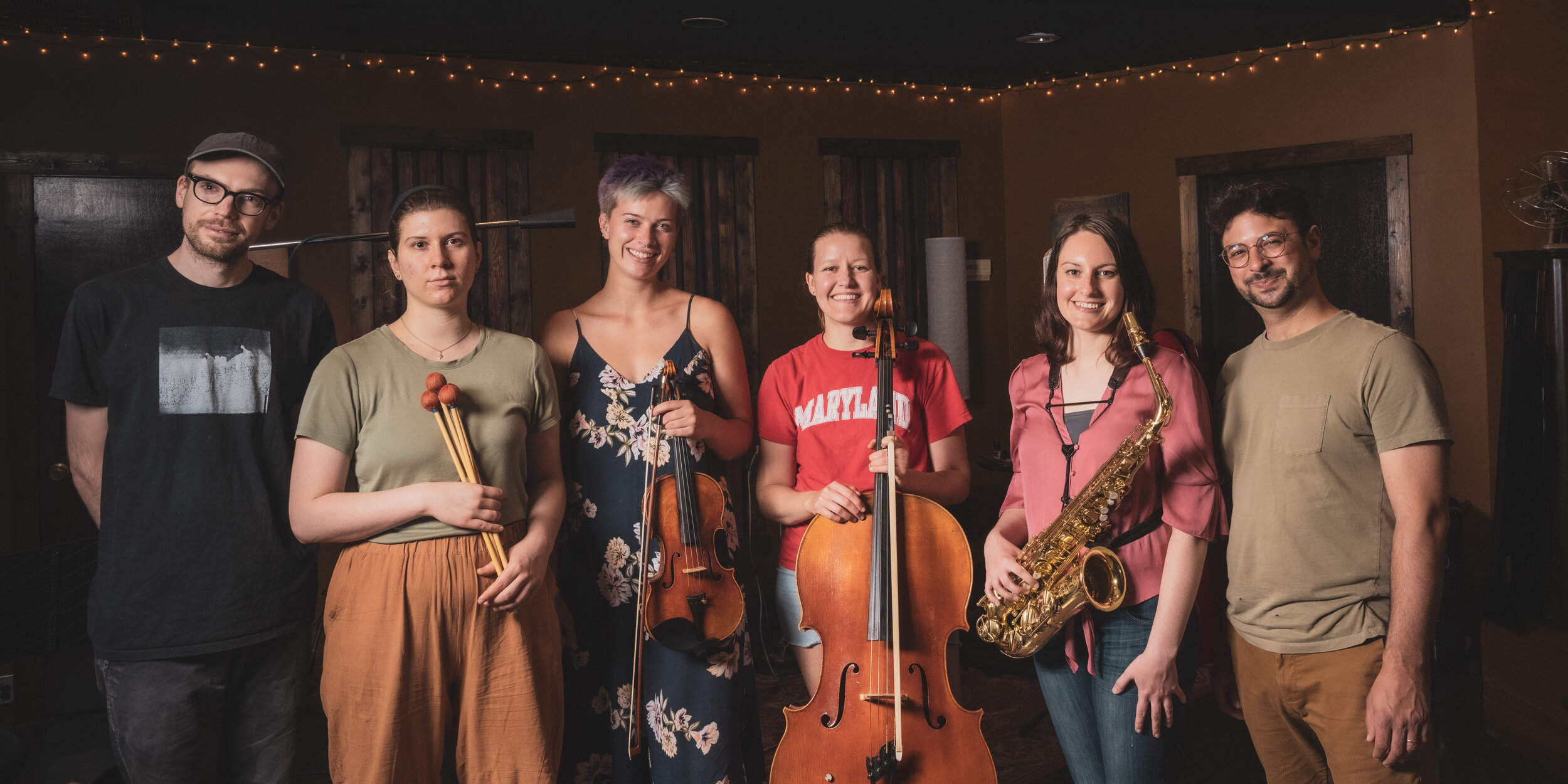
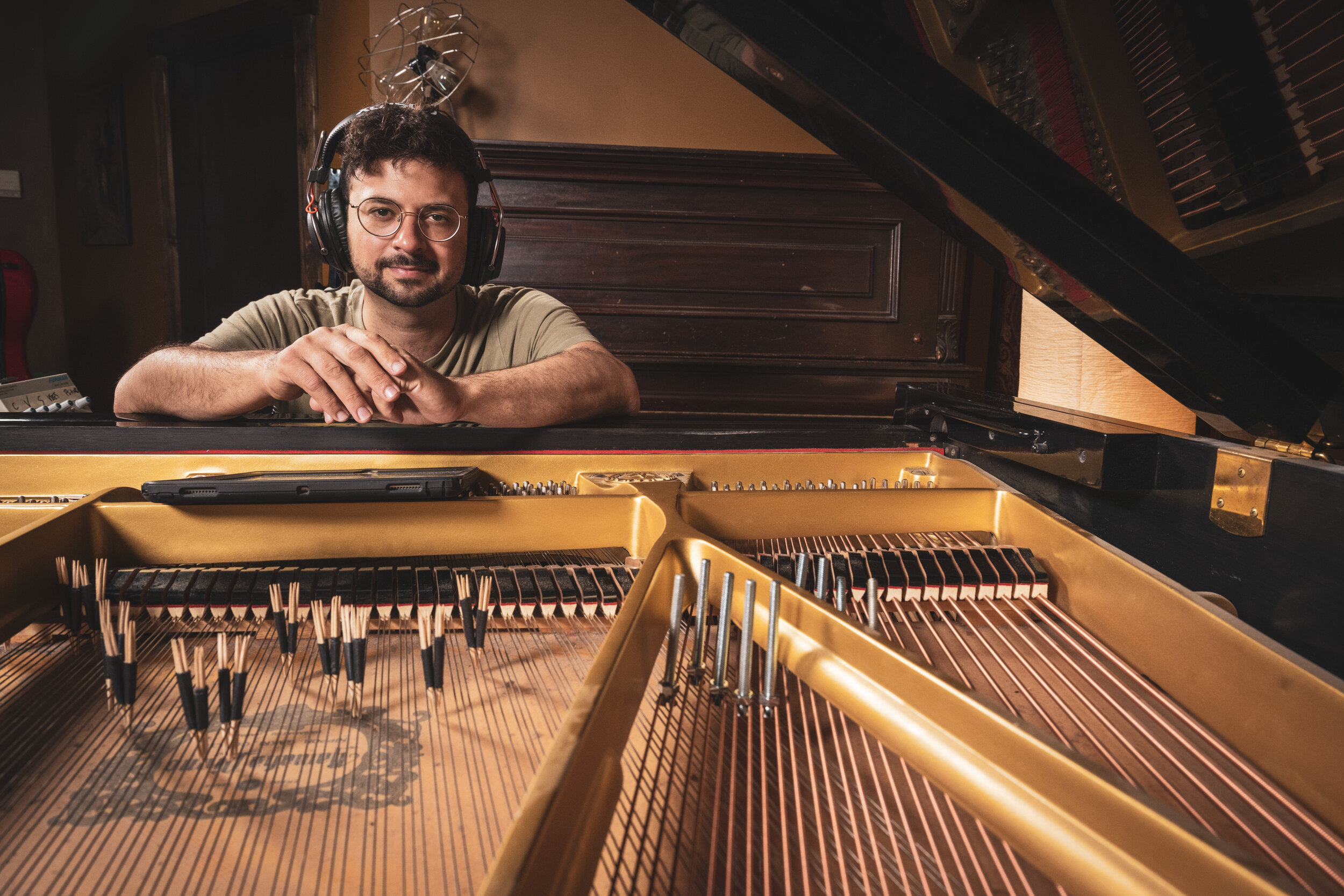
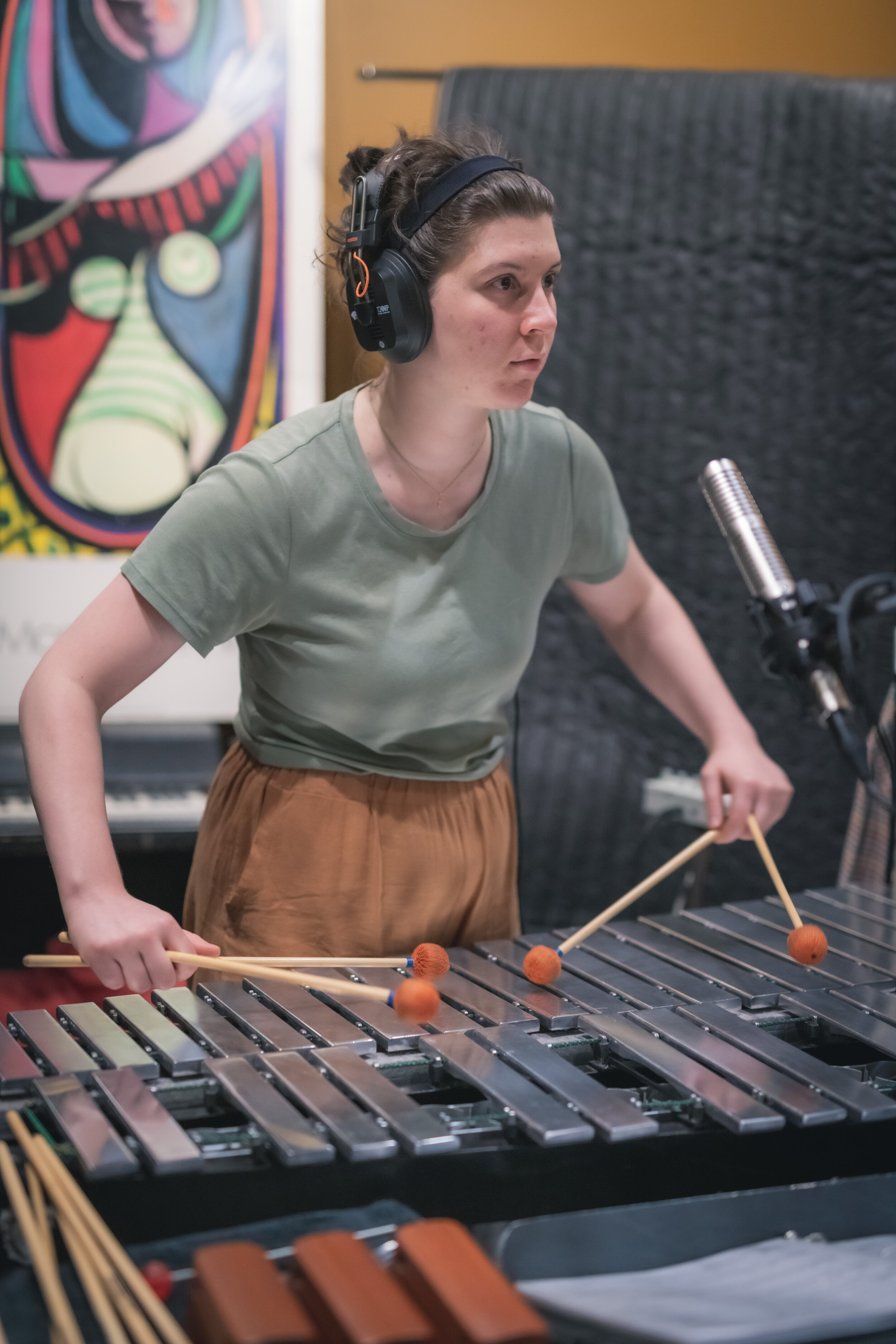
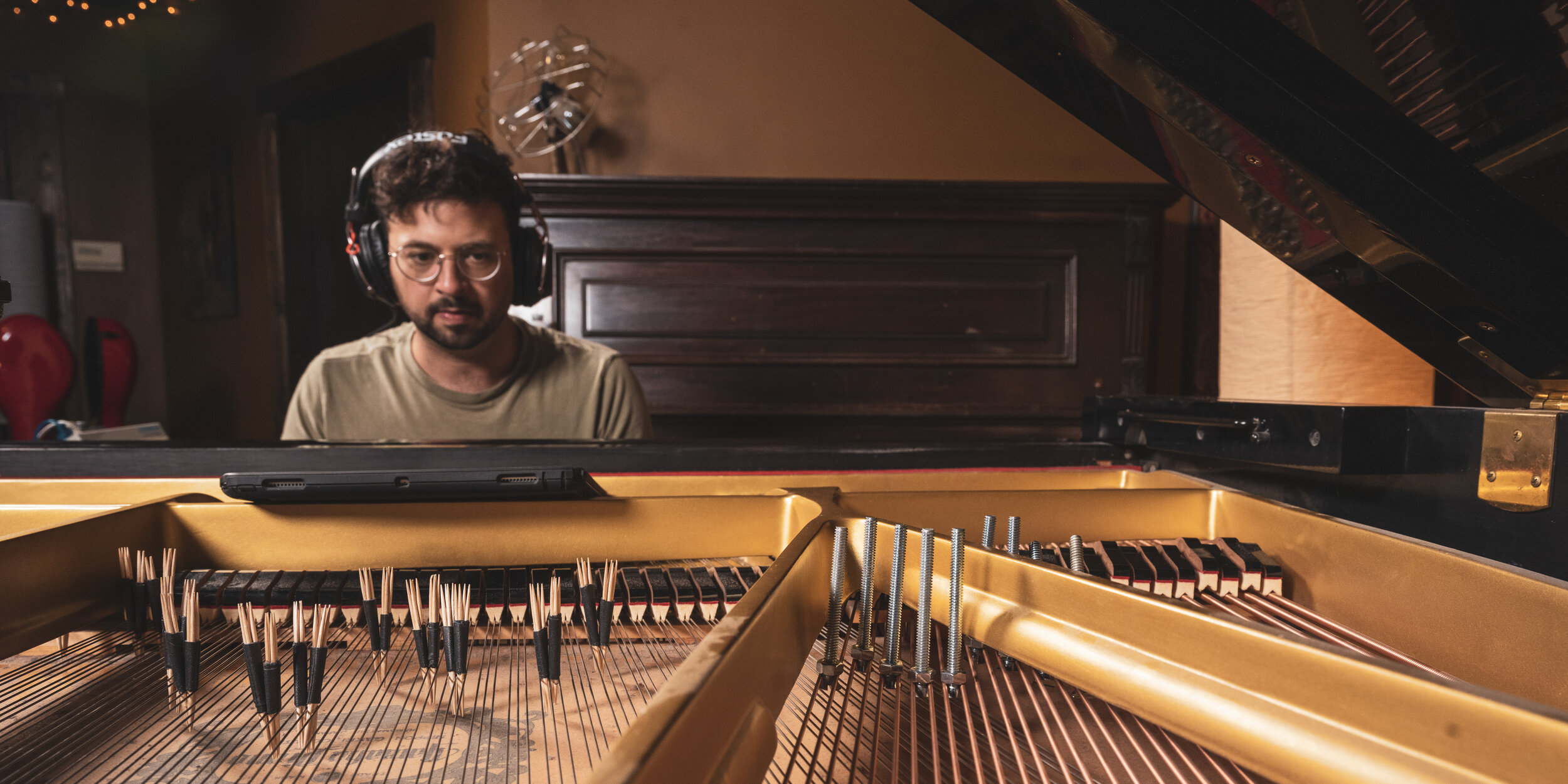
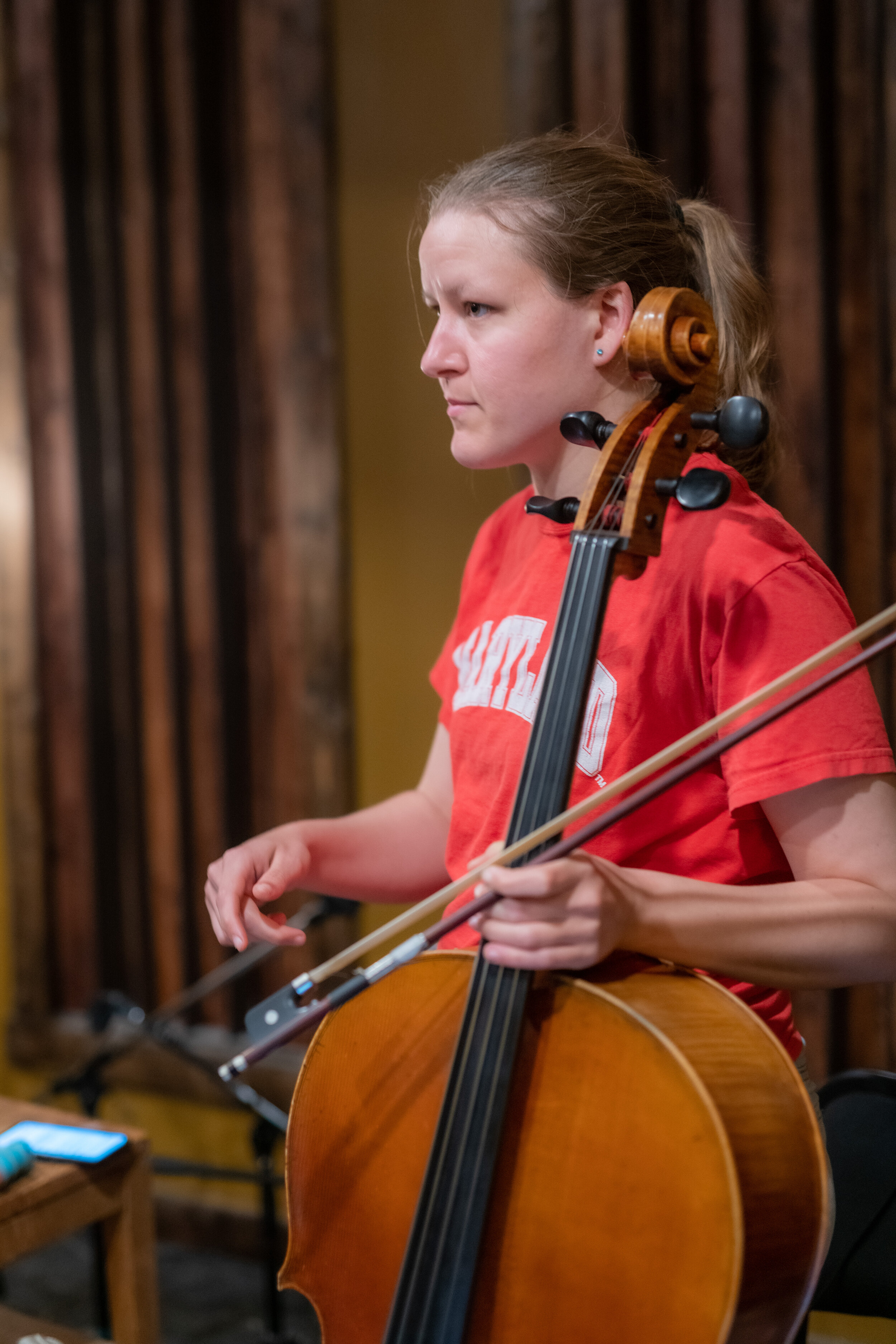
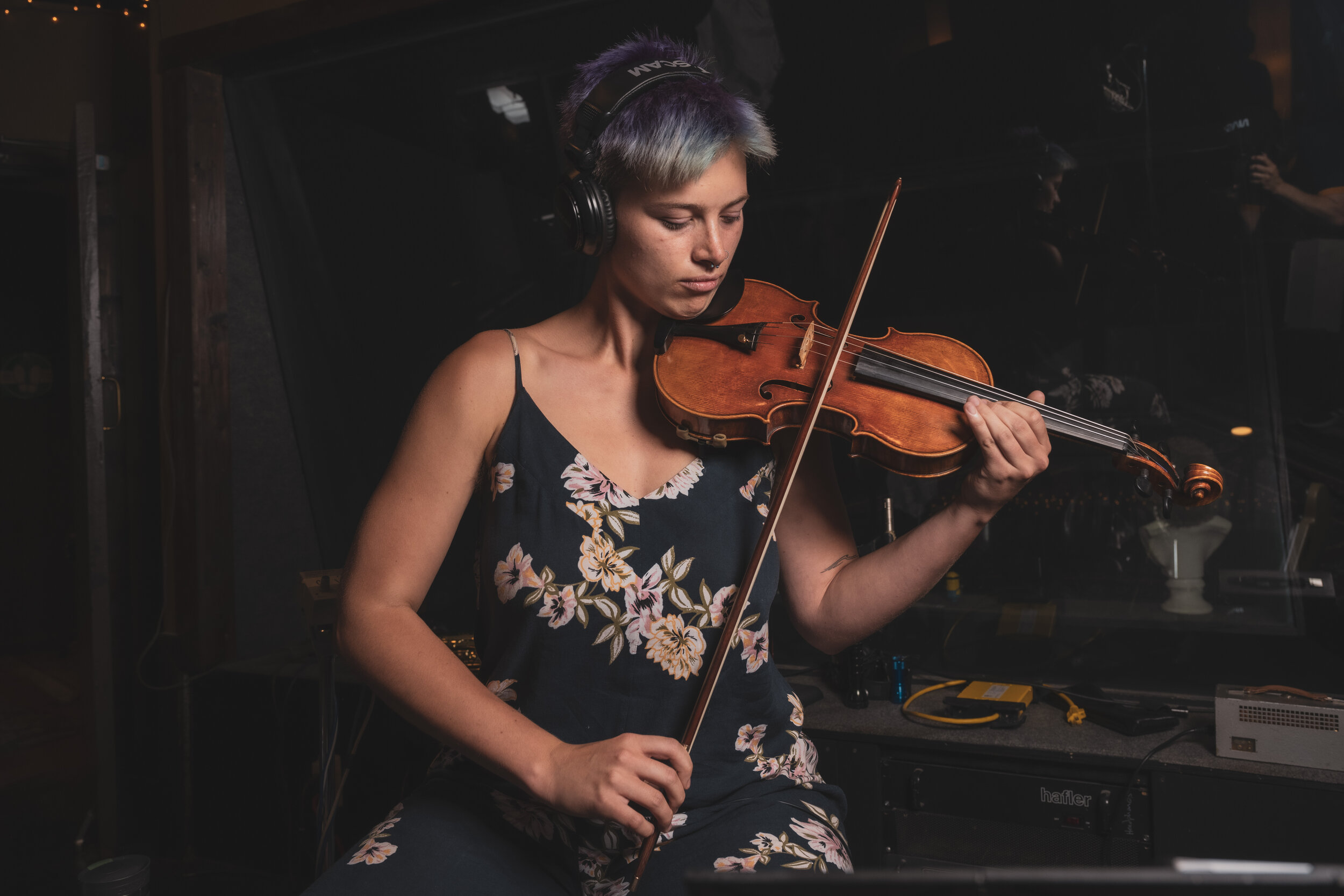
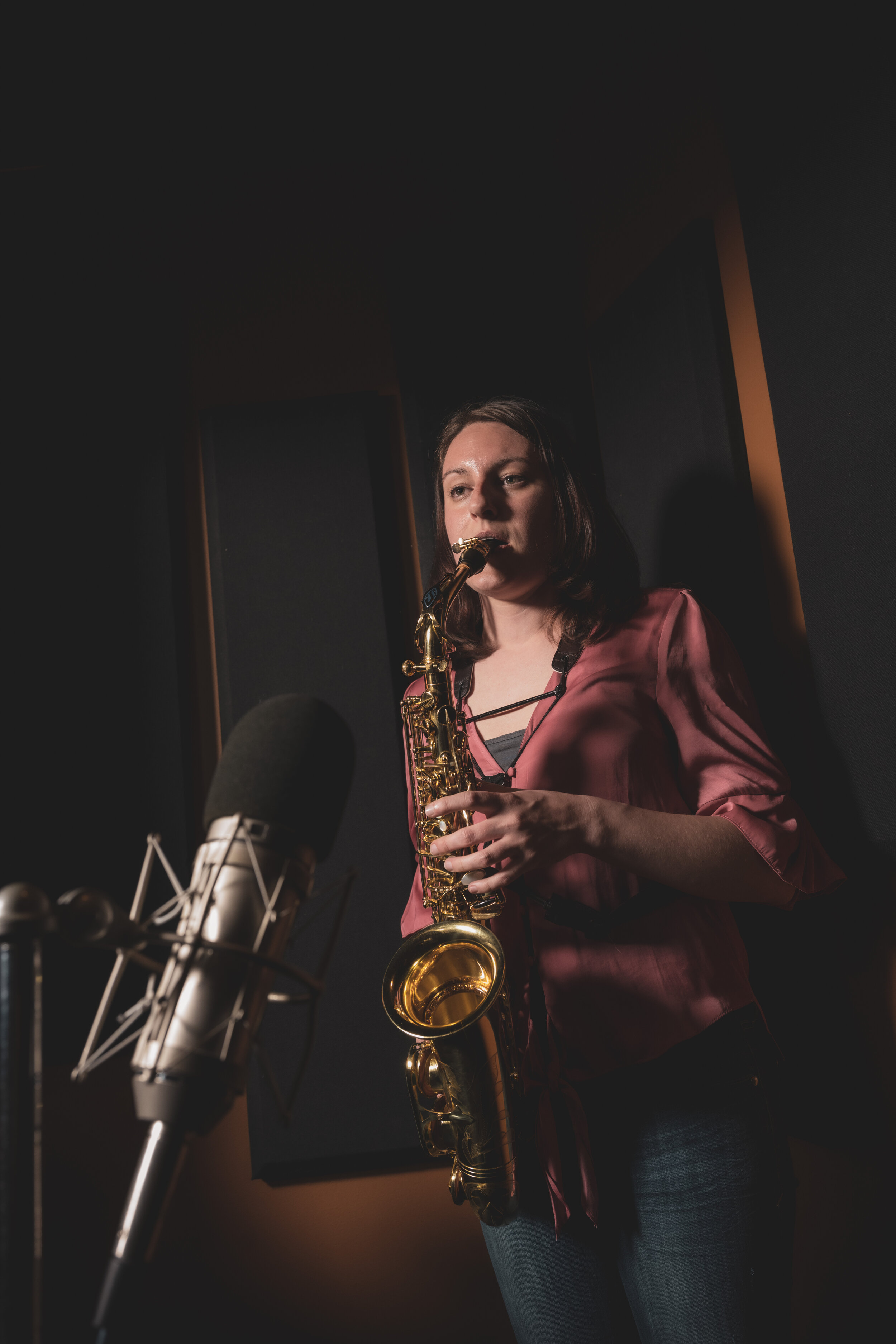
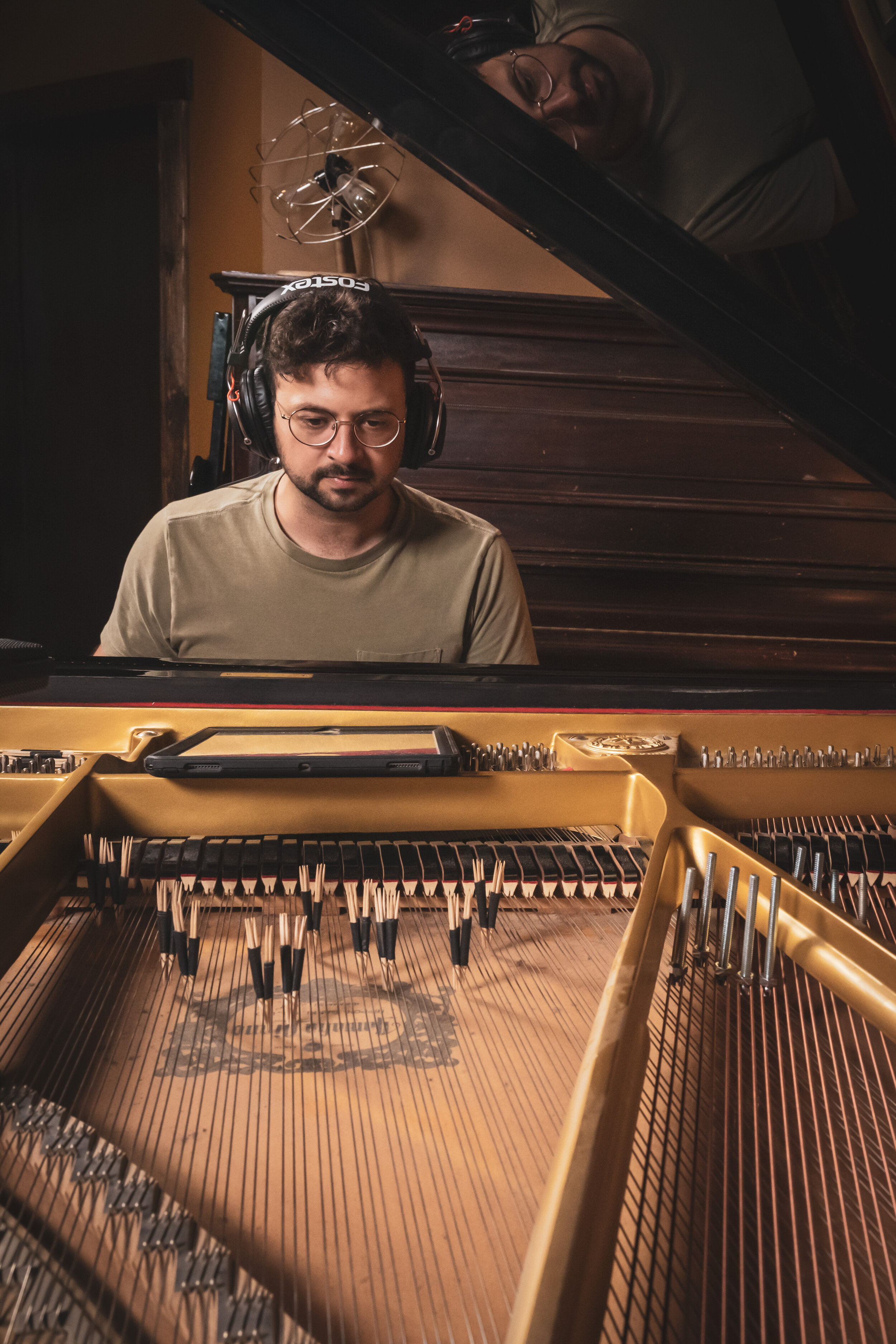
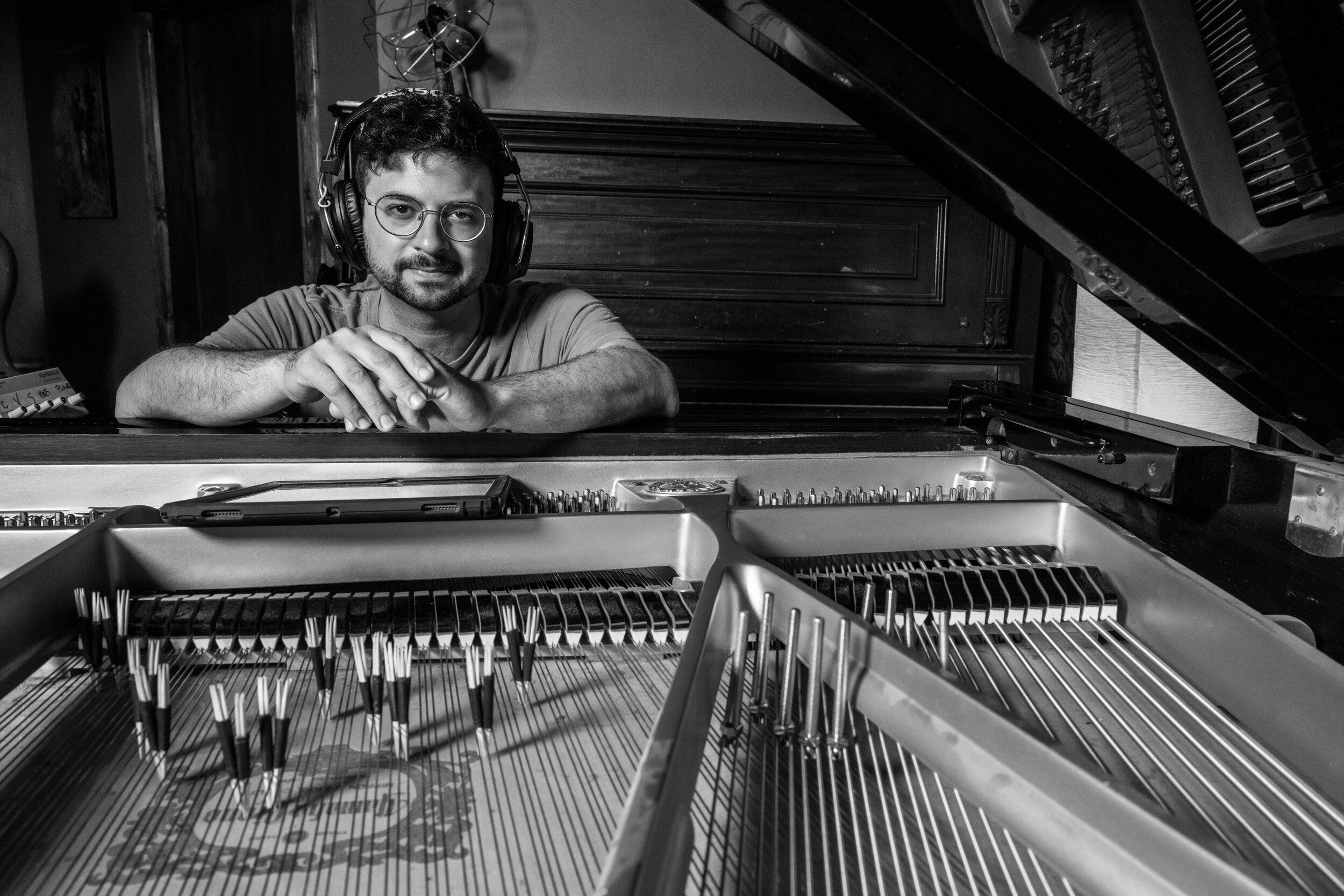
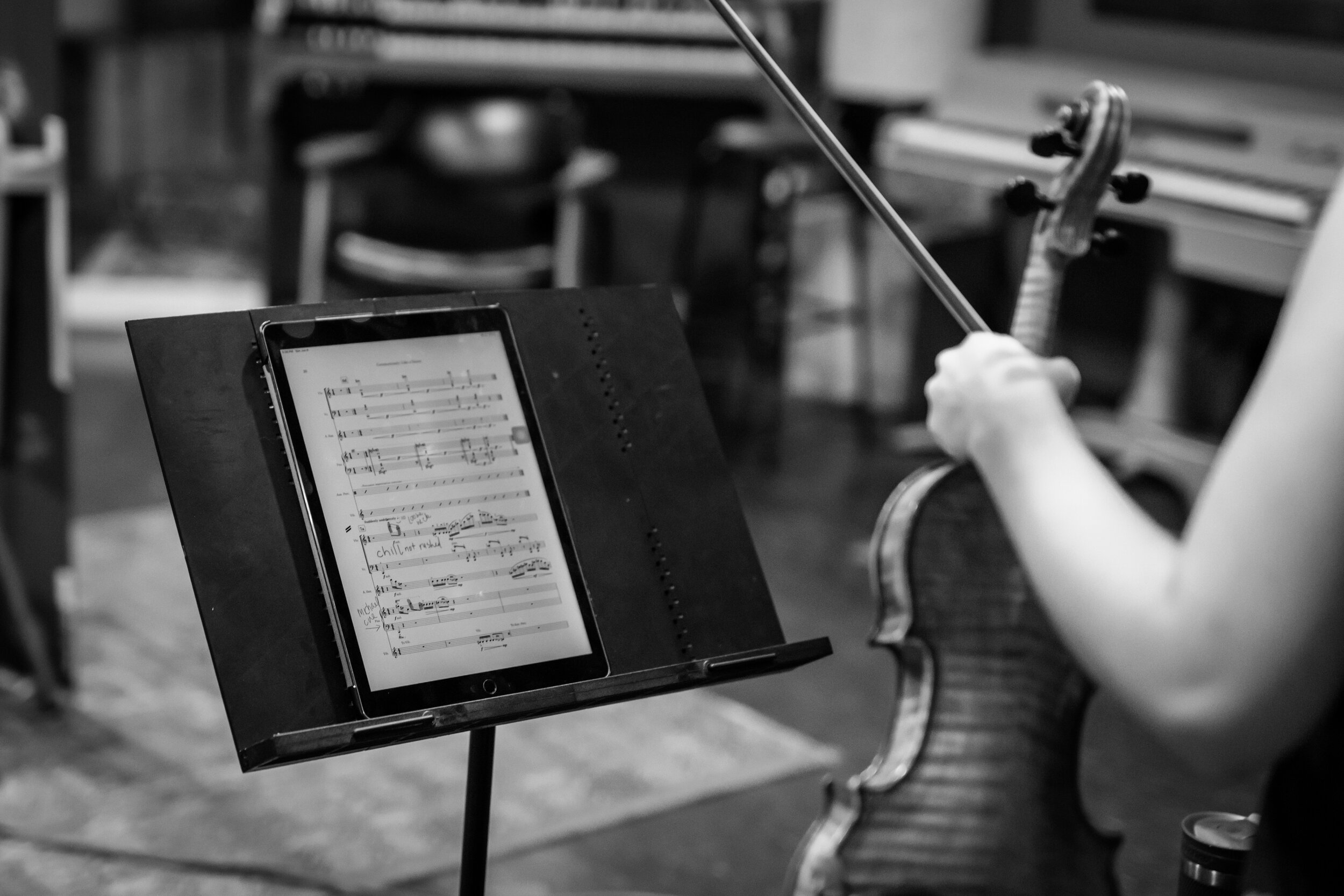
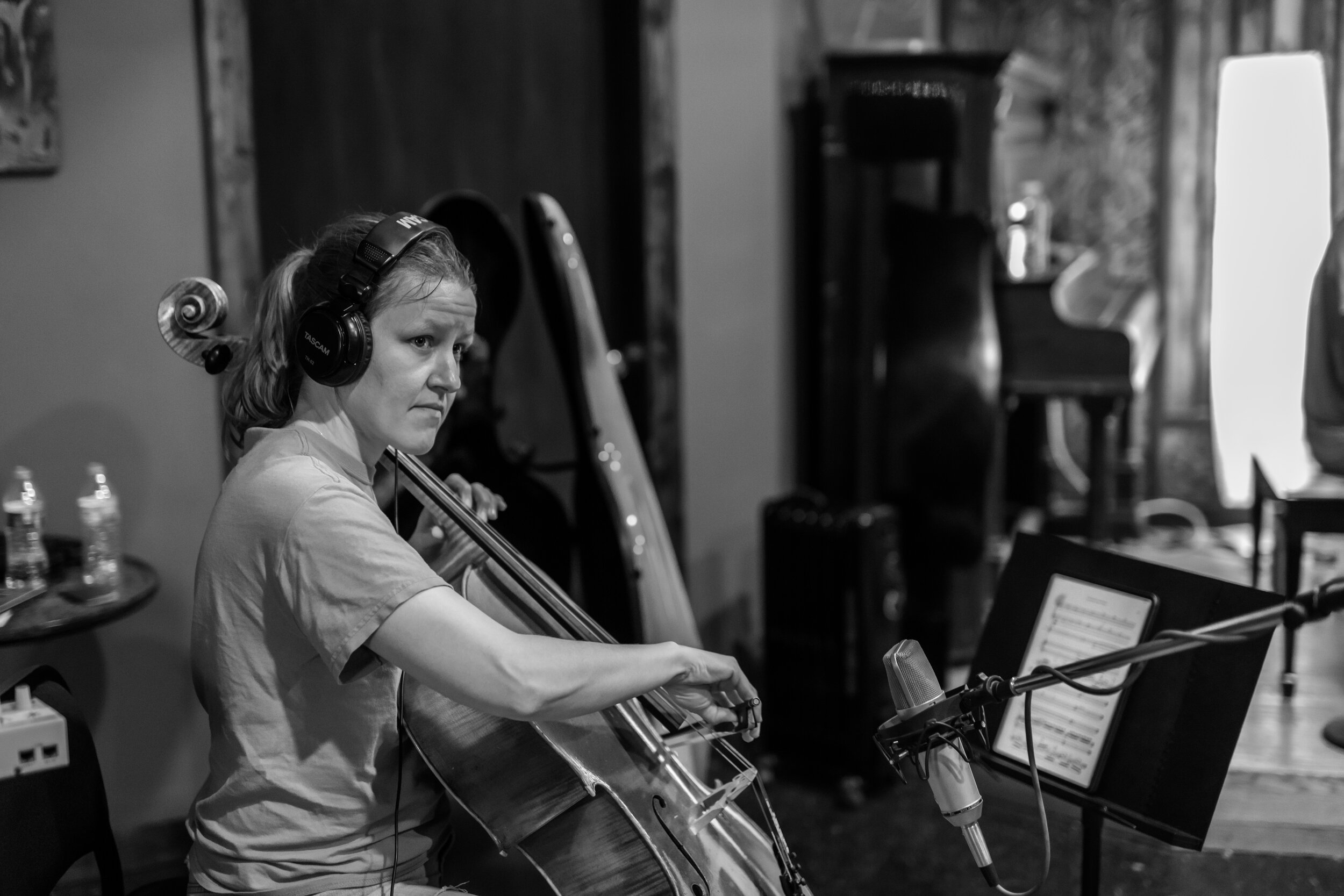

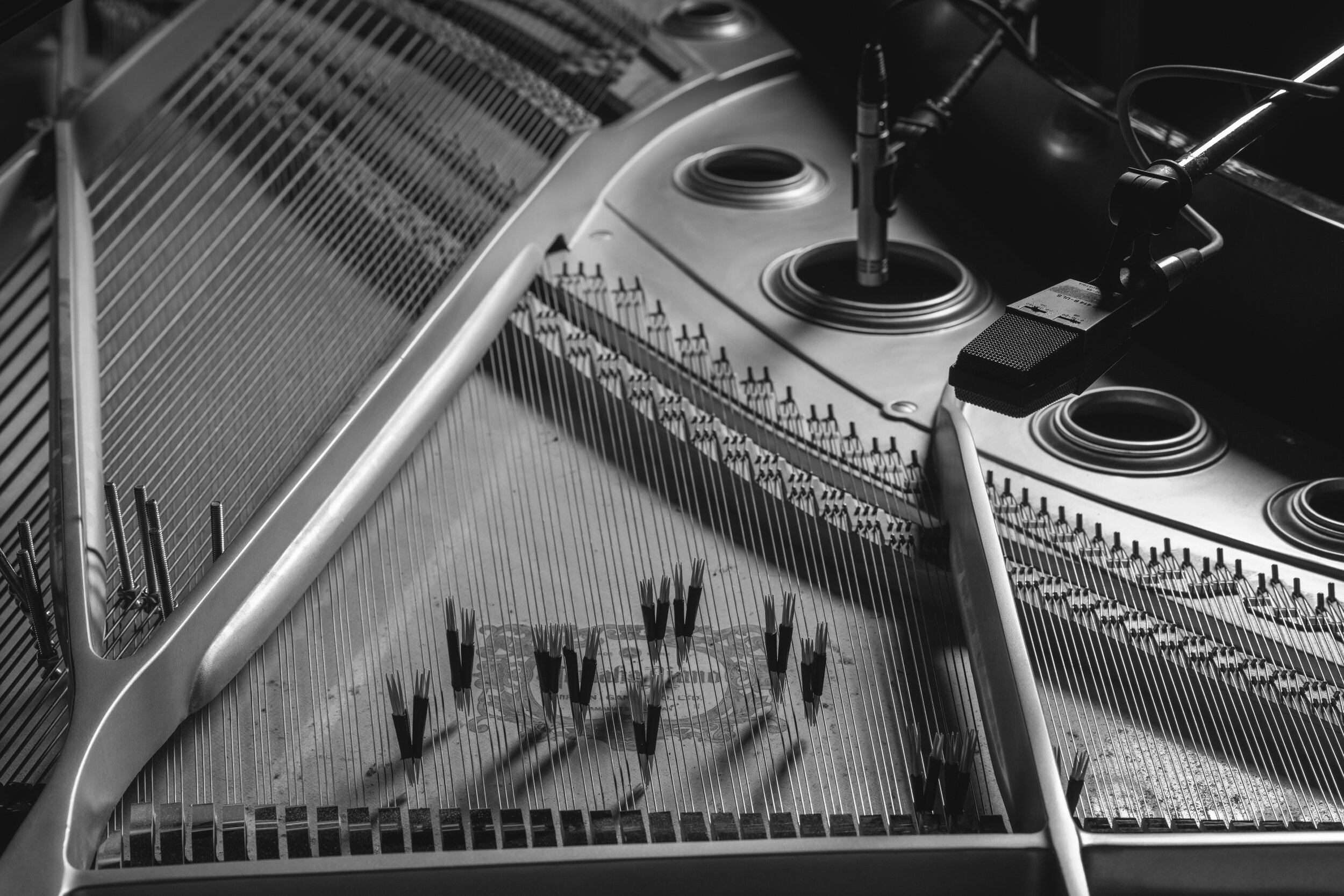
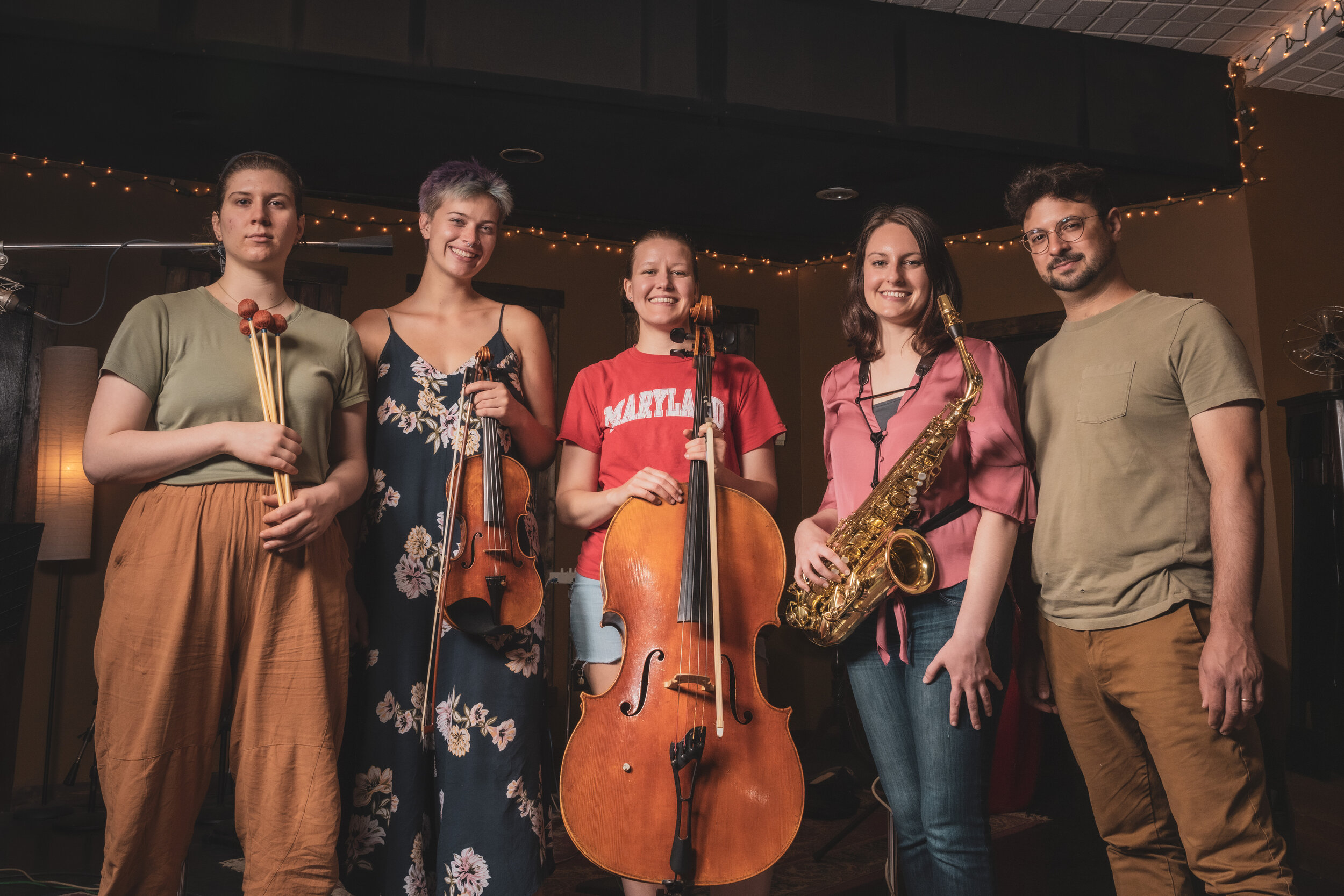
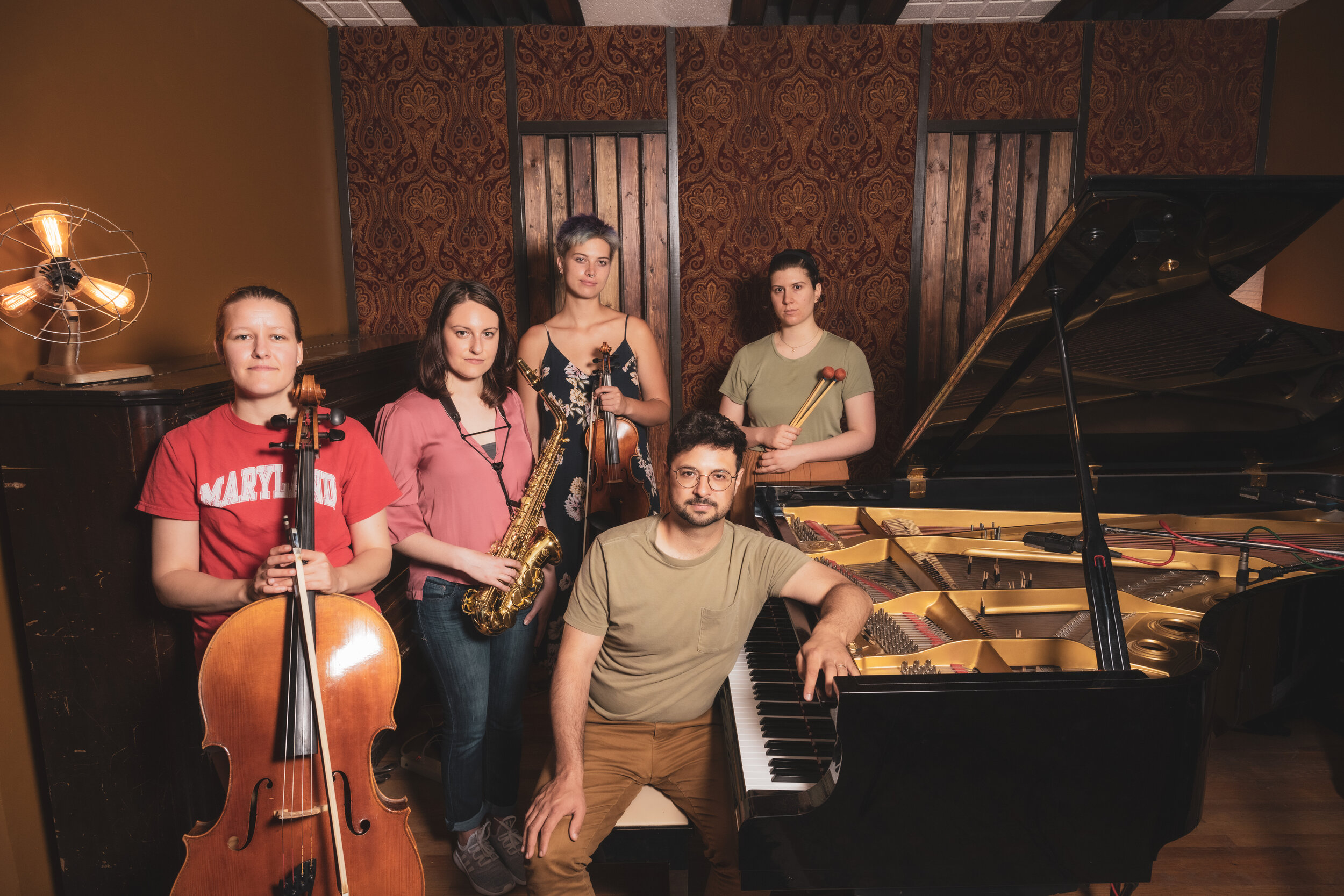
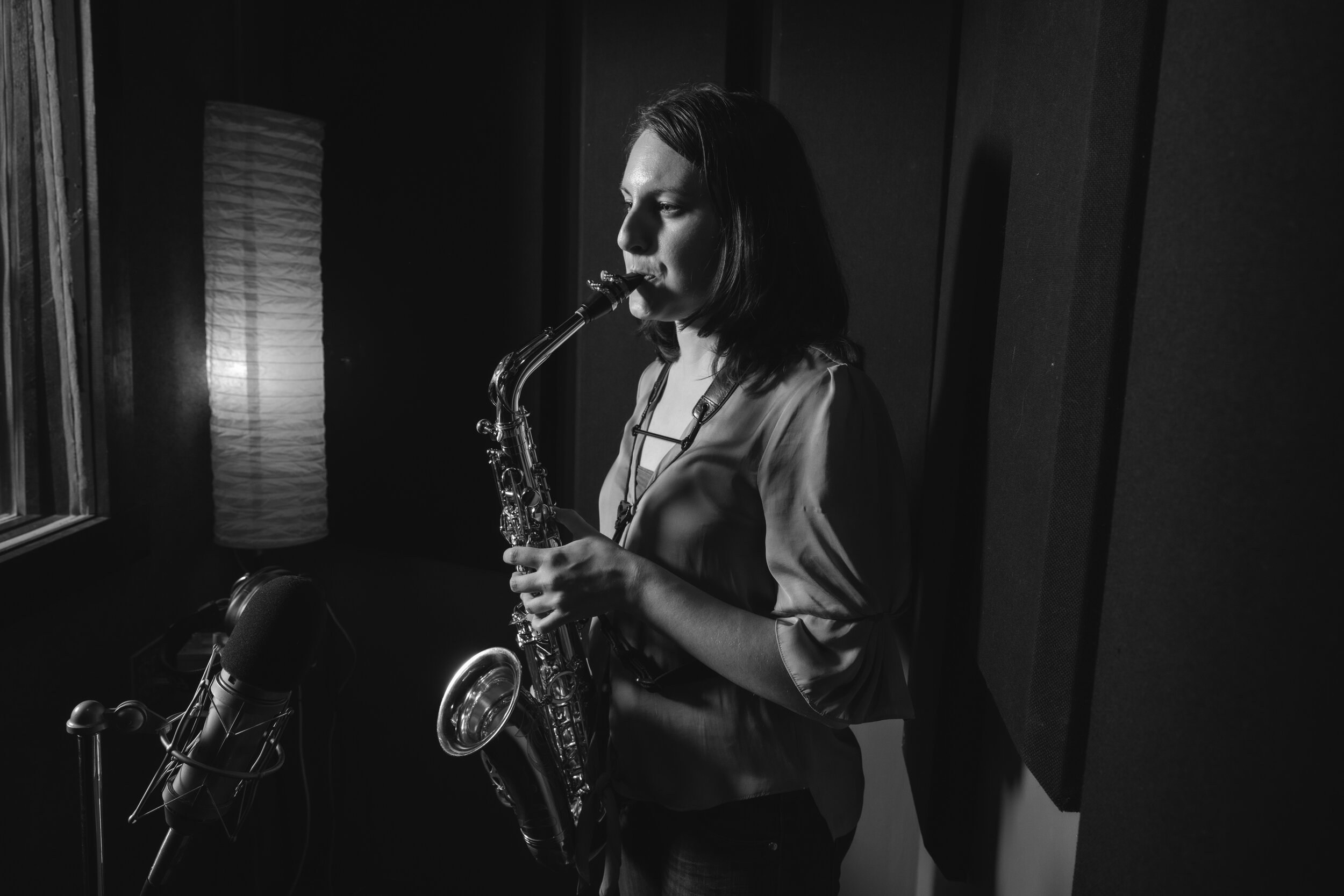
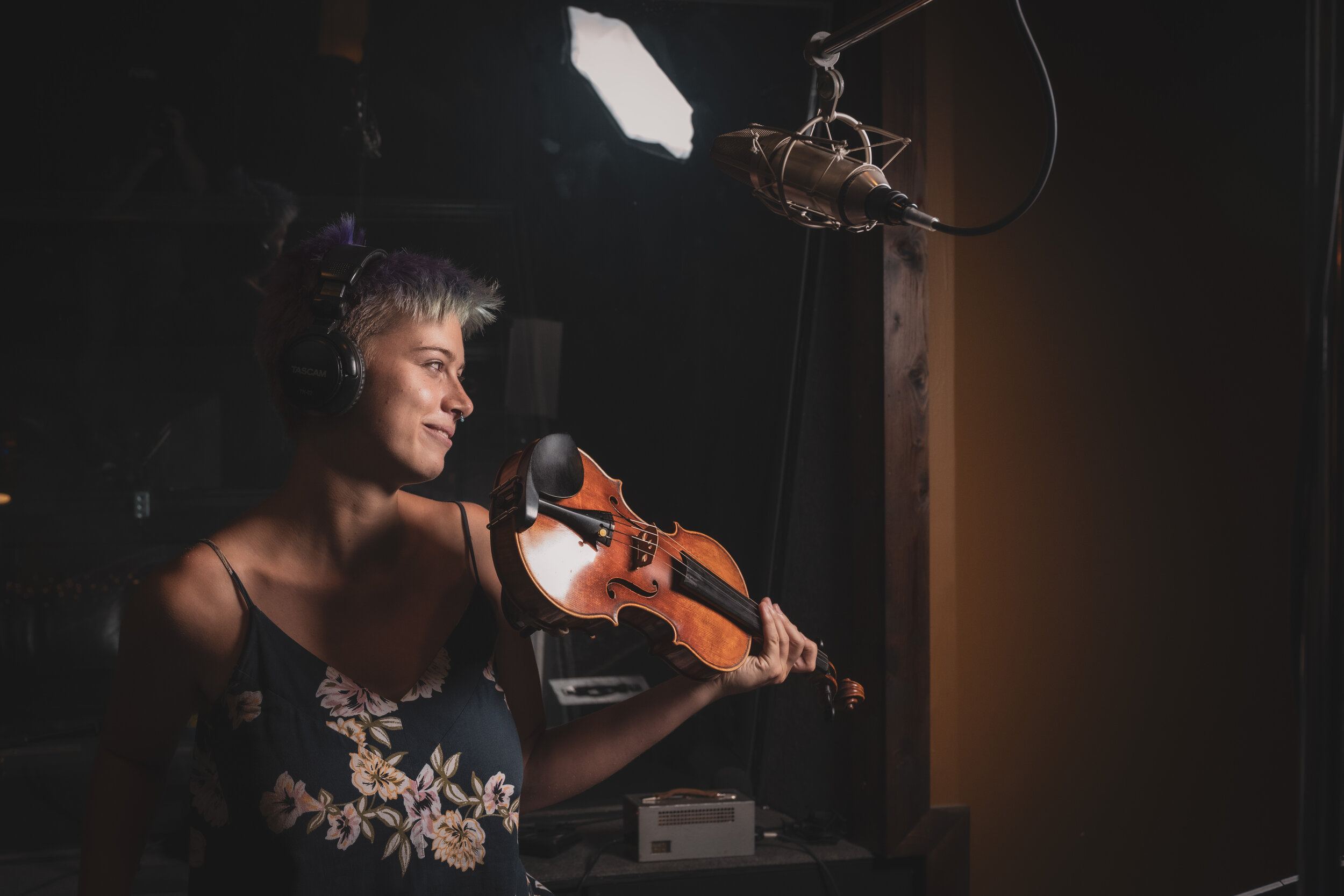
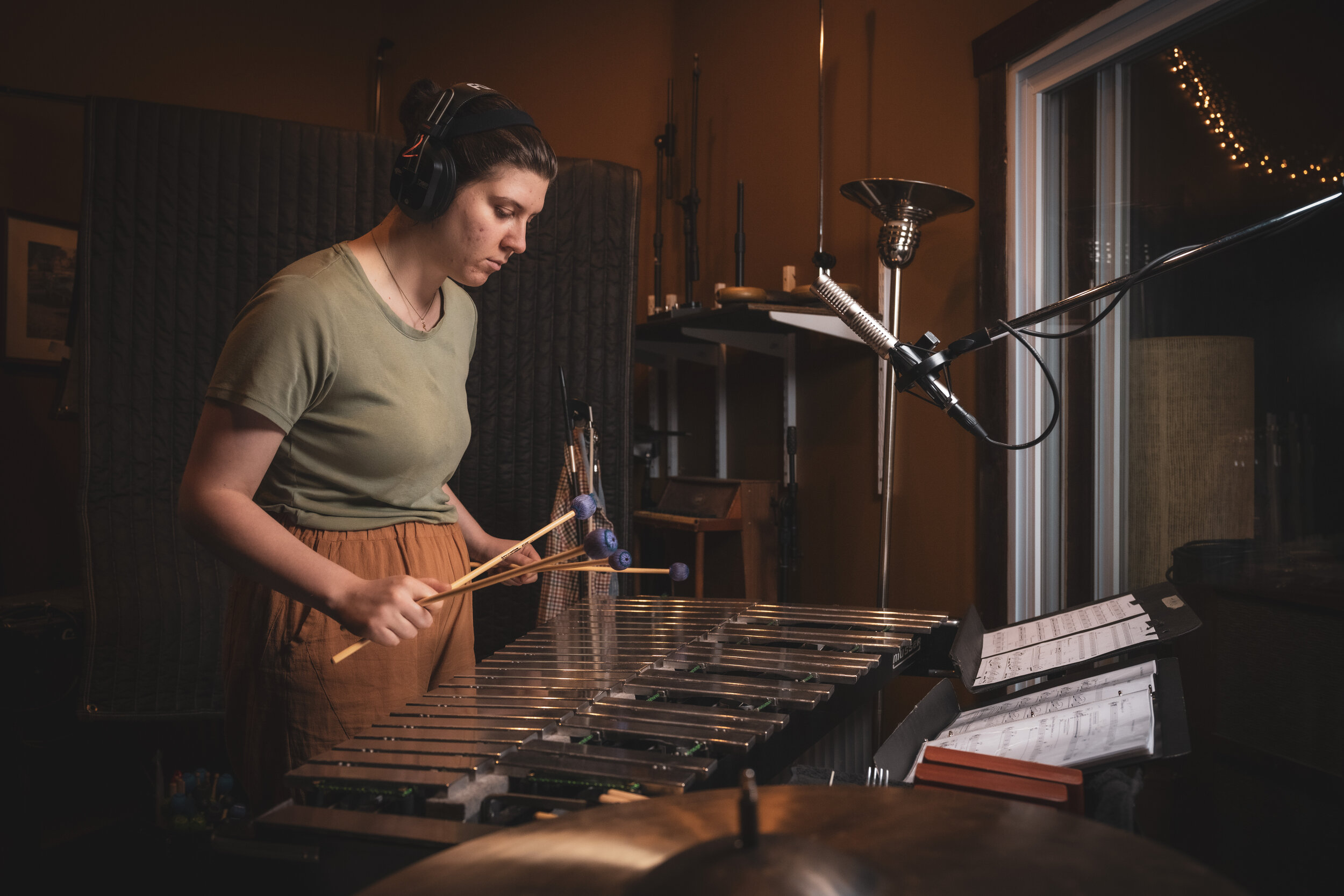
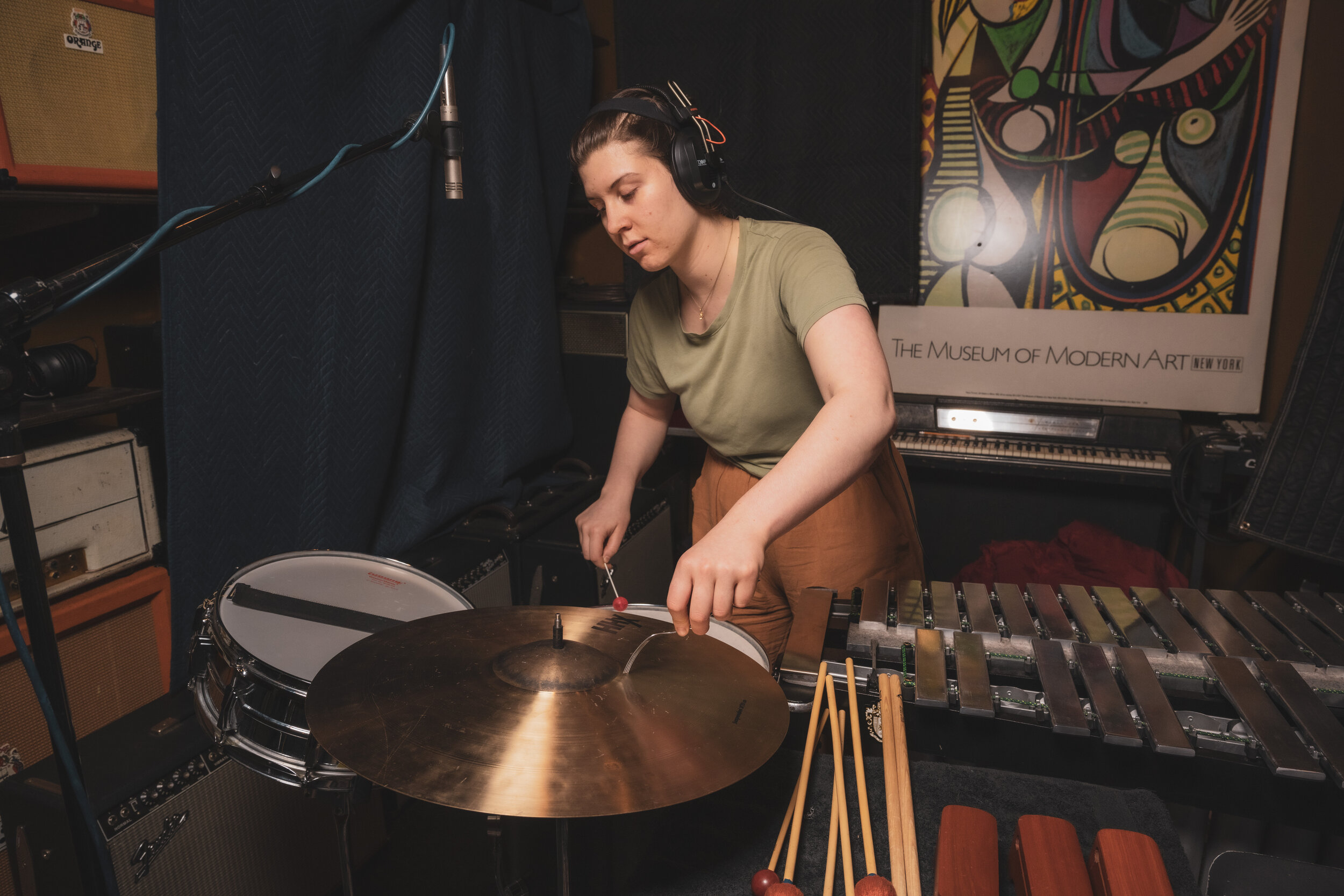
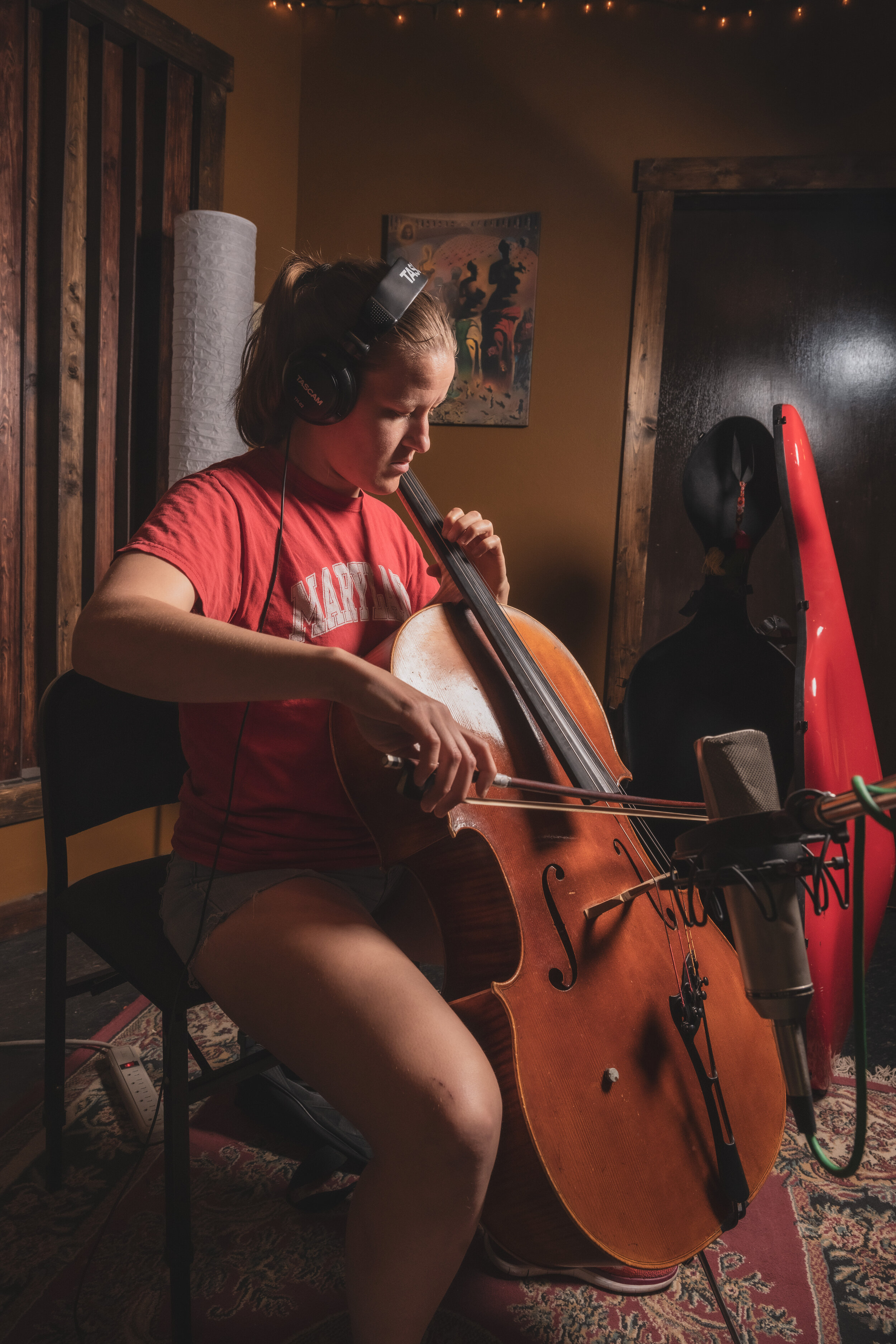
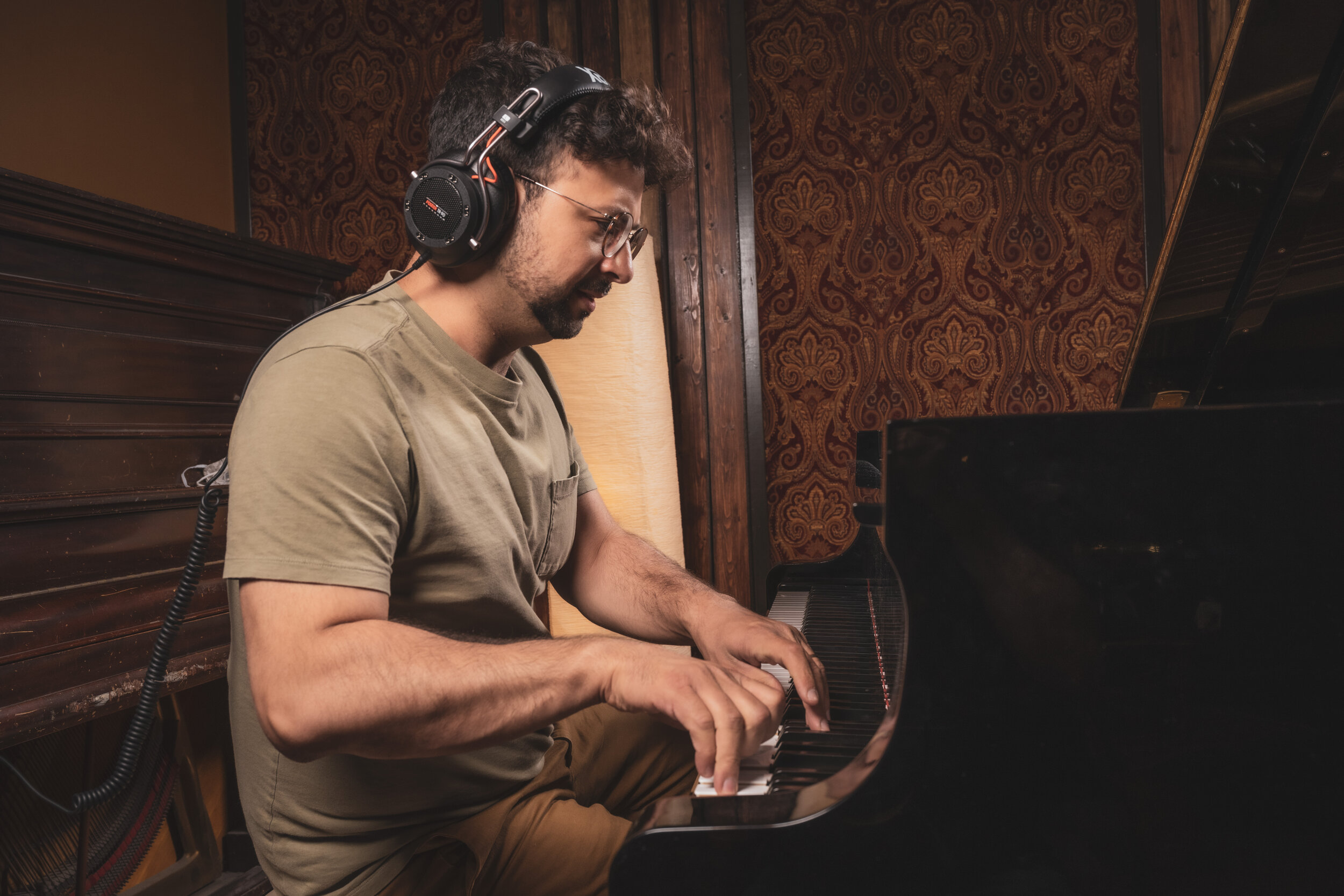
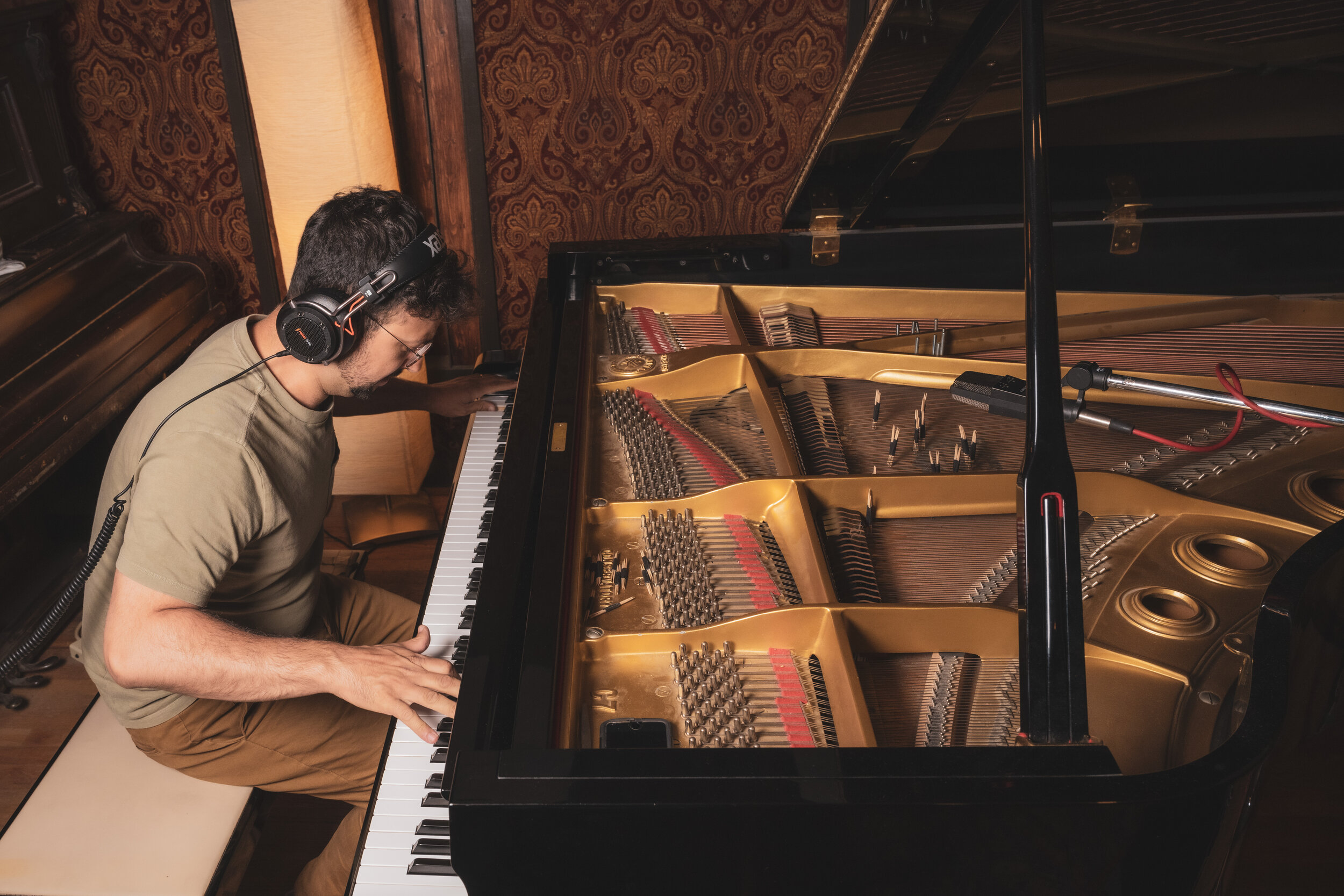
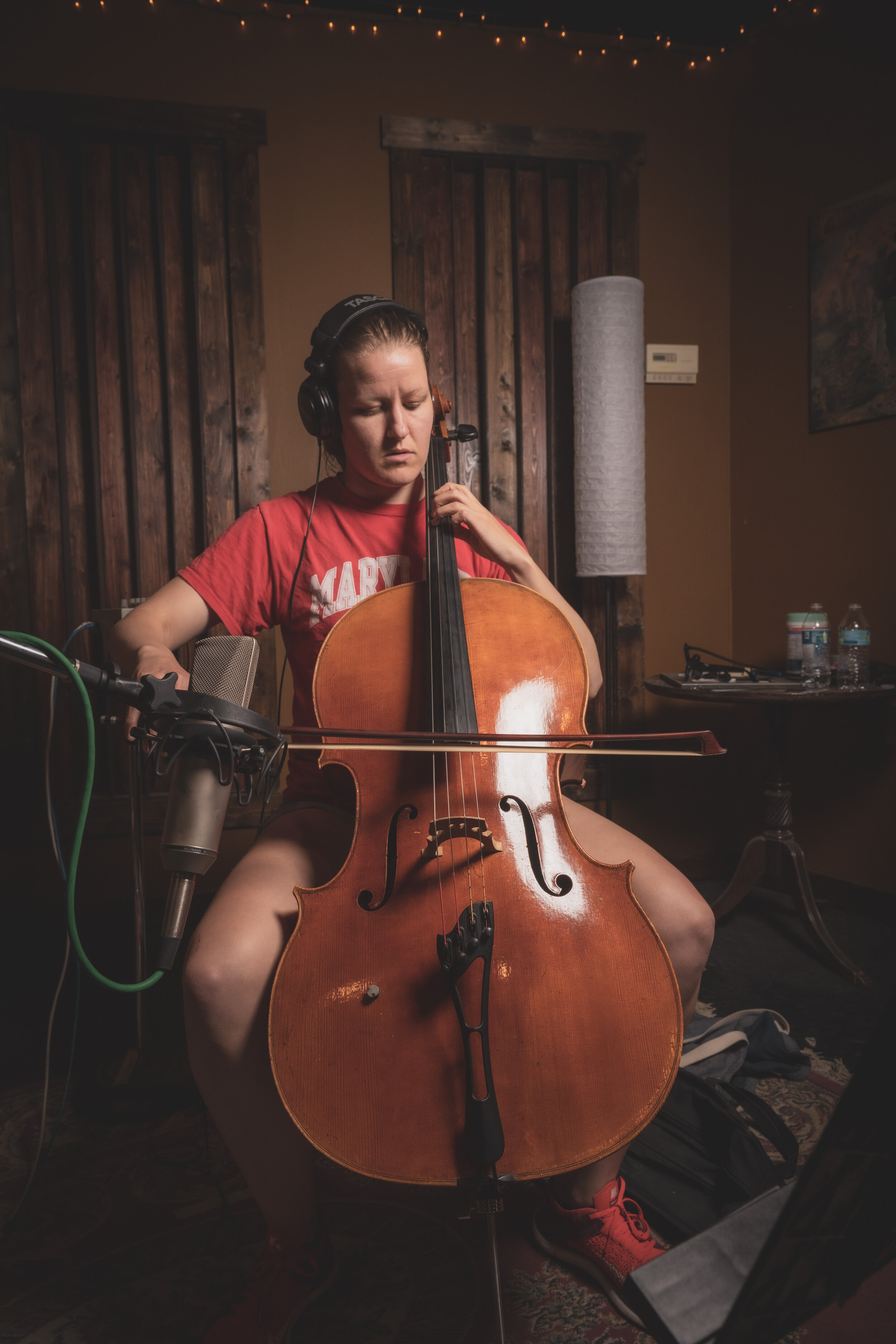
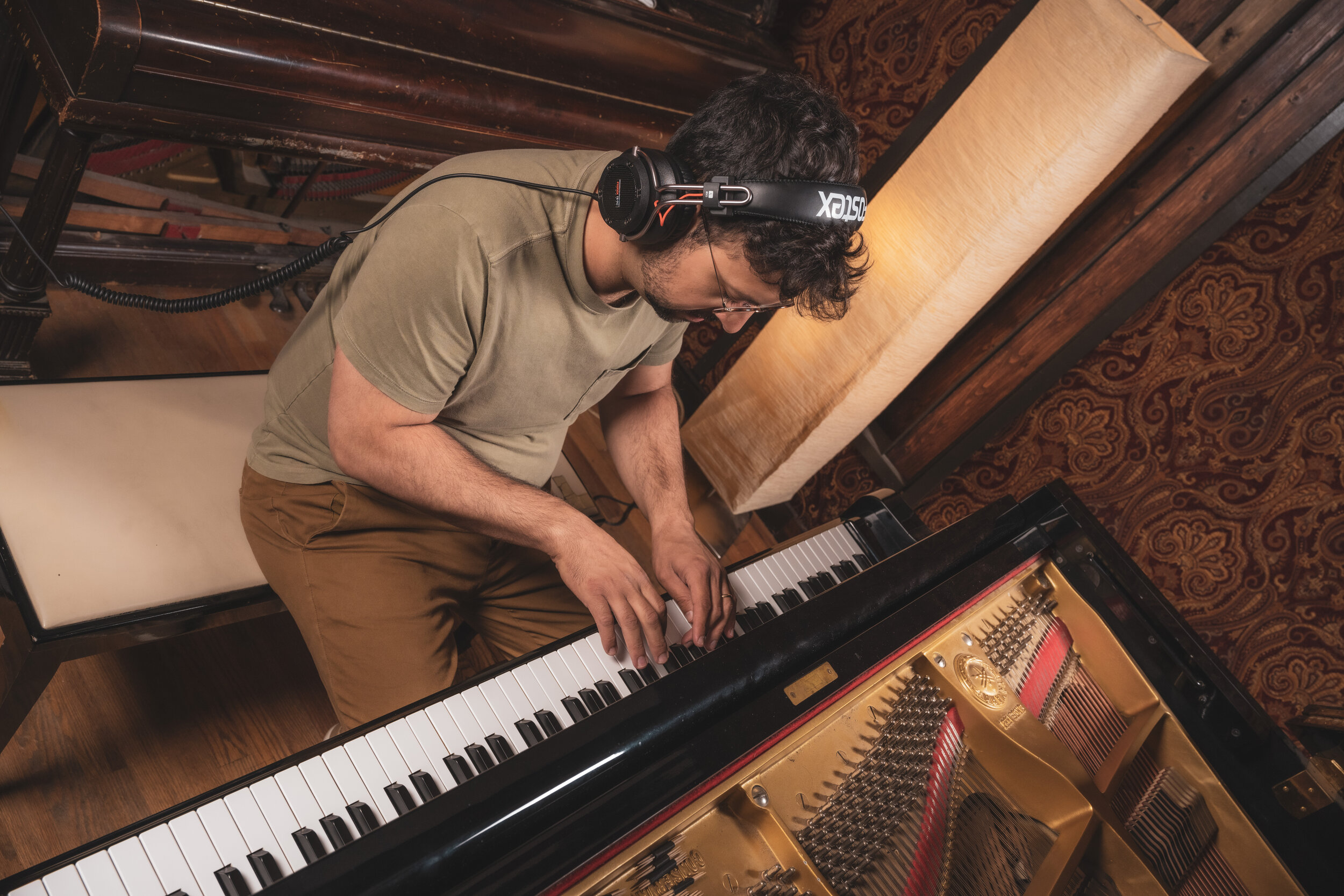
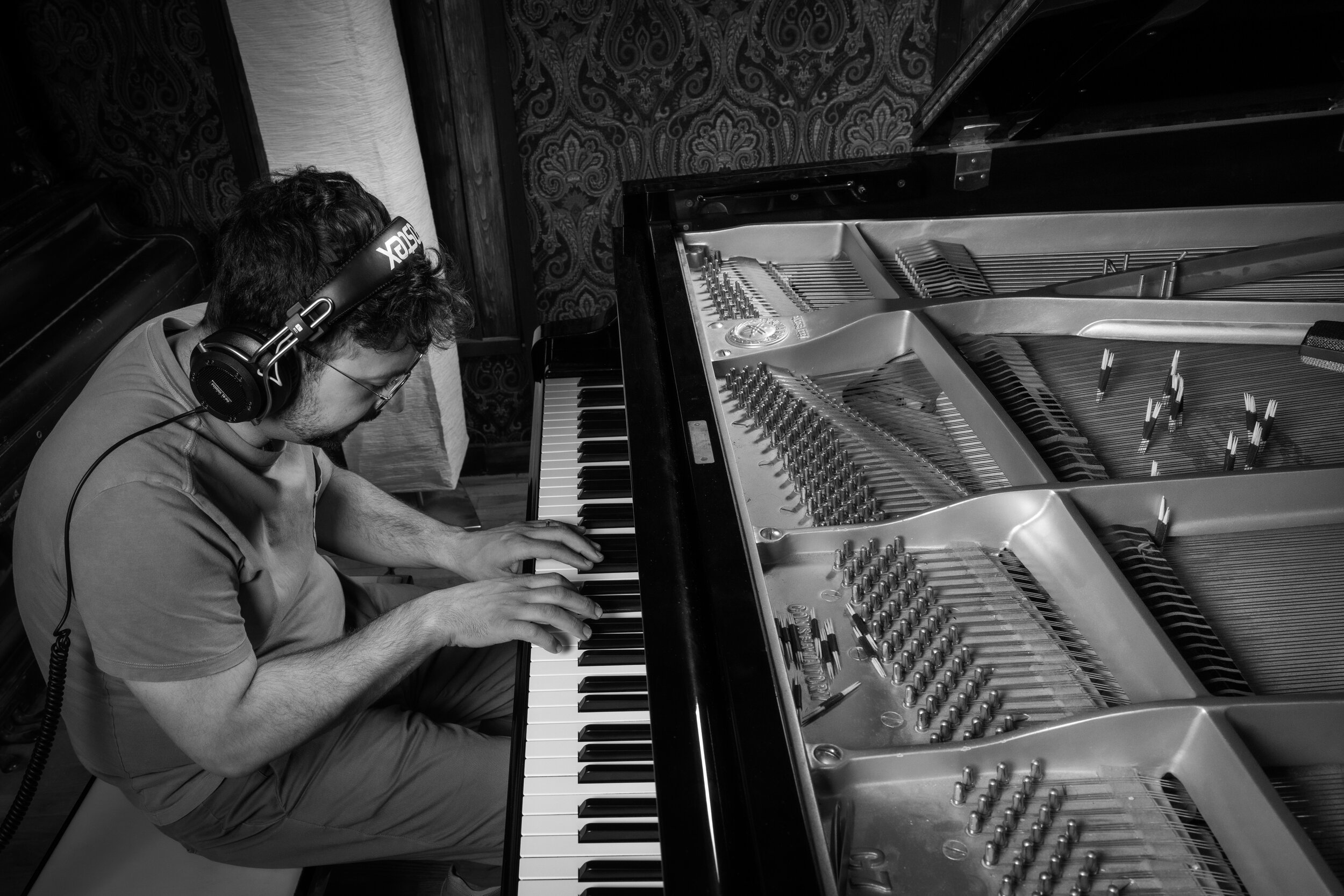


All photos by Doug Coombe | June 6-7 2021 |Tempermill Studio | Ferndale MI
About the ARTISTS
Michael Malis (b. 1988) is a composer, pianist, and music educator based in Detroit MI. A multi-faceted musical artist, he performs as a jazz musician, composes for the concert stage, and contributes to multidisciplinary collaborations.
photo credit: John Mark Hanson
2020 saw a proliferation of Malis’ work as a solo artist. In July of 2020, Malis released Dualisms, a multimedia project containing recordings, videos, and an accompanying 16 page zine of writings, artwork, and ephemera. Consisting of brand new original compositions, Dualisms features performances by Malis in duet with saxophonist Kaleigh Wilder, percussionist Thom Monks, and vocalist Denzel Donald, and features artwork by Zara Teicher. Each of the works presented in Dualisms were premiered at New Music Detroit’s 12th annual Strange Beautiful Music Festival in September 2019. All About Jazz praised Dualisms as “an extraordinary multimedia project which illustrates some of the remarkable ways artists in the age of COVID-19 found new approaches to displaying their craft and connecting with their audience.”
His March 2020 release, Three Pieces for Piano, was praised by the Southeast Michigan Jazz Association as “thrilling music, with shifting harmonic and rhythmic qualities that require prodigious precise technique and the kind of generic versatility that few pianists achieve.”
As a composer, Malis has been commissioned by Detroit Chamber Winds and Strings, Chamber Music Society of Detroit, Great Lakes Chamber Music Festival, Detroit Composers’ Project, Virago, Hole in the Floor, and others. His piece Five Stations, premiered in May 2019, featured Malis and saxophonist Marcus Elliot alongside a string quartet of musicians from the Detroit Symphony Orchestra. His string quartet, Emerge, was premiered at the Detroit Institute of Arts in 2018. His piece for piano and cello, Coda, was premiered by Detroit Symphony Orchestra principle cellist Wei Yu in 2018.
In April 2019, Malis and Elliot, who join forces under the duo known as “Balance,” undertook a collaborative performance piece with former Detroit poet laureate Bill Harris. The piece, which featured drummer Gerald Cleaver, set Harris’ collection of short stories I Got to Keep Moving. According to AllAboutJazz.com, “what was most striking about the synergy between Harris and the band was the sheer beauty of the music: the stark contrast between the grim realities of Harris's story and the band's melodic core, located in Elliot's exultant phrases and Malis's evocative runs, was stirring. And much of the music's strength was found in the spirit of resilience and defiance that permeates Harris's text.” The duo’s 2017 eponymous album was praised by the Detroit Metro Times as “contemporary jazz of the highest order, a benchmark for where the genre can go.”
In July of 2015, Malis’ self-released debut album as a leader, Lifted from the No of All Nothing, was called by The Detroit Free Press “an uncommonly mature and distinctive debut.” It was described by Hot House Jazz Guide (NYC) as “cover[ing] a broad range of free expression. [Malis] bridges the gap between original composed, complex material and the spontaneity of improvisation.” In September 2016, his trio made their debut at the Detroit International Jazz Festival.
As a pianist, he has shared the stage with a diverse array of musicians, including notables such as Marcus Belgrave, Gerald Cleaver, Jaribu Shahid, John Lindberg, William Hooker, A. Spencer Barefield, Tyshawn Sorey, Ken Filiano, J.D. Allen, Andrew Bishop, Dennis Coffey, and Marion Hayden. He has performed at the Yokohama Jazz Promenade (Yokohama, Japan), the Kennedy Center, Birdland (NYC), and The Stone (NYC).
vi·ra·go
/vəˈräɡō/
Virago is a new voice in classical music. Marked by intense chemistry and resistance to creative norms, Virago melds free improvisation and contemporary chamber music into a contagious headspace of out-of-the box expression. This unusually instrumented quartet improvises through collaborations with composers, audience members, visual artists, and musicians across genres, marking the path for the future of chamber music.
photo credit: Annette Isabelle
Virago has performed at the Matthaei Botanical Gardens, University of Michigan Museum of Art, K.Oss Art Gallery, Argus Farm Stop, Ziggy’s, Duderstadt Video Studio, Third Place [MusicFest], GrandStand Music Festival, and other festivals, concert halls, local businesses and public spaces across Michigan. Current projects include ongoing collaborations with Detroit-based composers Harriet Steinke and Michael Malis, as well as a live video and audience participation installation with the A.W.E Society.
Passionate about the impact of free improvisation on personal and creative growth, Virago facilitates free improvisation workshops for K-12 students. Students are encouraged to access their creative voice more fluently and frequently, fostering abstract and critical thinking, highly democratic group decisions based on mutual respect and listening, risk-taking, and catharsis through personal creative expression.This ongoing program has been piloted at Beecher Schools in Flint, MI and at Girls Rock Detroit in Detroit, MI.
Virago was founded at the University of Michigan in 2018, and is based in Ann Arbor and Detroit, Michigan. Virago has been supported by the EXCEL Lab, ArtsEngine, Arts at Michigan, and the department of Diversity, Equity and Inclusion at the University of Michigan School of Music, Theatre and Dance.
Virago is: Sofia Carbonara (percussion), Wesley Hornpetrie (cello), BethAnne Kunert (alto/soprano saxophones), Meg Rohrer (violin/viola).
Zara bio and headshot
